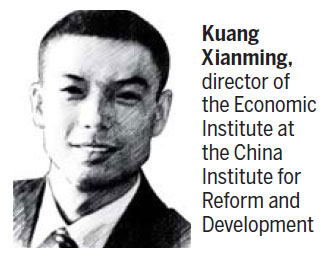The changes and challenges for economy in 2013
Updated: 2012-12-20 08:54
(China Daily)
|
||||||||
A1
The economic situation in 2012 was beyond previous expectations. Many anticipated that the economy would bottom out in the second quarter, but stabilization failed to occur so early.
|
 |
The highlight of the economic situation in 2012 was the increasing contribution of consumption. In the past 10 years, the contribution of final consumption expenditure to GDP has lagged behind that of investment, but that trend was reversed in 2012.
A2
The proactive fiscal policy and the prudent monetary policy will remain in the coming year. Although some experts are talking about the political cycle's impact on economic development, it seems unlikely that the new leadership will launch new stimulus measures merely to safeguard "steady growth".
But that doesn't mean that some investments, especially those needed to accelerate urbanization, won't be made.
A host of reforms could be launched in 2013, including the overall plan for income distribution, pricing reforms of energy resources, and measures to improve equality of public services. Industries related to people's livelihoods, such as education and healthcare, are facing a period of opportunities to meet the current gap between supply and demand.
A3
We expect the economic growth rate in 2013 to be around 8 percent. It may fluctuate by 0.2 percent up or down. The consumer price index will likely be around 3 percent in 2013 and may fluctuate by 0.1 percent without taking the external situation into account.
However, external factors also matter as the latest rounds of quantitative easing in the United States may trigger higher imported inflationary pressure.
A4
The key step ahead to promote urbanization is to help China's 160 million migrant workers settle down in cities, which would not only boost equality, but also could unleash huge demand.
Most of the migrant workers still face barriers when trying to access equal social welfare. Local governments must reduce their reliance on land finance deals, and urbanization should be market-oriented instead of led by administrative orders.
A5
The US economy may see weak growth of around 2 percent, while the eurozone is still trapped in a recession, and its performance won't be better than this year.
The worst scenario is a breakup of the eurozone, but that's not likely. The economic situation in emerging economies may be a bit polarized in the coming year. The Indian and South African economies may face greater pressure, while the outlook for the Chinese, Russian and Brazilian economies is more optimistic.

 Relief reaches isolated village
Relief reaches isolated village
 Rainfall poses new threats to quake-hit region
Rainfall poses new threats to quake-hit region
 Funerals begin for Boston bombing victims
Funerals begin for Boston bombing victims
 Quake takeaway from China's Air Force
Quake takeaway from China's Air Force
 Obama celebrates young inventors at science fair
Obama celebrates young inventors at science fair
 Earth Day marked around the world
Earth Day marked around the world
 Volunteer team helping students find sense of normalcy
Volunteer team helping students find sense of normalcy
 Ethnic groups quick to join rescue efforts
Ethnic groups quick to join rescue efforts
Most Viewed
Editor's Picks

|

|

|

|

|

|
Today's Top News
Health new priority for quake zone
Xi meets US top military officer
Japan's boats driven out of Diaoyu
China mulls online shopping legislation
Bird flu death toll rises to 22
Putin appoints new ambassador to China
Japanese ships blocked from Diaoyu Islands
Inspired by Guan, more Chinese pick up golf
US Weekly

|

|







